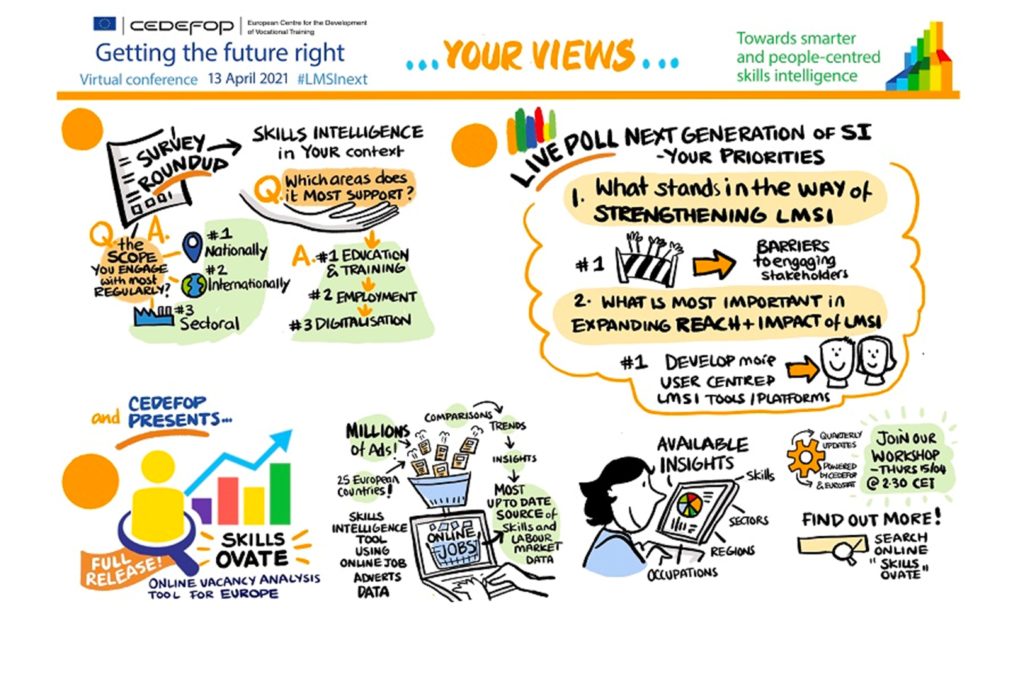Cedefop hosted conference on skills intelligence
15/04/2021

On 13 April 2021, Cedefop (European Centre for the Development of Vocational Training) held an online high-level conference on Labour Market and Skills Intelligence (LMSI). Cedefop has been working on skills trends in the labour market and organised this conference to discuss about skills intelligence and further develop its research and tools in the field for the coming years. This event provided insights about how the future LMSI can contribute to understand current challenges and prepare the post-COVID-19 recovery to be more digital and greener. This conference was chaired by Antonio Ranieri (Head of Department for Learning and Employability, Cedefop) and featured presentations from Cedefop’s experts working at the organisation’s departments for Skills and Labour Market. Furthermore, two important tools were introduced during the event: the Insights from Cedefop’s European Skills Forecast, and the OVATE tool for online vacancy analysis.
The conference was introduced by Jürgen Siebel (Cedefop Executive Director) with these inspiring words: “We, Cedefop, want to get the future right, we want to shape a new generation of skills intelligence with you and for you.” It was also introduced by Commissioner Nicolas Schmit (European Commissioner for Jobs and Social rights) who highlighted the fact that the impact of the COVID-19 pandemic has widened the skills gap in Europe, not only in the health sector but in every other sector as well. That is why active labour market policies must play a central role for the recovery. Following this introduction, Marju Lauristin (Professor at the University of Tartu) made a keynote speech related to digital skills in Estonia: “The future is not tomorrow, the future is today.” She highlighted the fact that the pandemic revealed a lack of digital skills for teleworkers and warned about the need to find a way to implement such skills by including other aspects – combining for example digital and communication competences.
The second part of the conference was moderated by Jasper Van Loo (Coordinator of the Department for Skills and Labour Market, Cedefop) and was shaped as a round table. Cedefop experts reflected on LMSI’s development opportunities of. They also discussed how to use different skills anticipation methods as a basic component to build a new generation of labour market and skills intelligence. According to the panellists, skills intelligence should focus on green skills as a priority. A greener Europe will provide with new types of “green jobs” even though it is hard to foresee the kind of skills that will be needed for the green transition. In this context, a massive upskilling and reskilling effort will be needed.
The last part of the conference, moderated by Maria Brugia (Deputy Director at Cedefop) reflected on how to shape the conditions for developing, promoting and disseminating a people‑centred LMSI, and discussed the role of different actors in this process. The third panel was composed of Manuela Geleng (Skills Unit Director, DG EMPL, European Commission), Maria Jespen (Deputy director of Eurofound), Agnes Roman (ETUCE), Robert Plummer (Business Europe) and Albrecht Wirthmann (Eurostat). All panellists insisted on the importance of developing strong partnerships to develop an effective LMSI that helps companies and people to manage and shape the transition. Maria Brugia stated that “skills intelligence development on a large scale will not be a one-off response to the current situation; it is here to stay. It will help us understand trends, skills needs and gaps, but also point the way to suitable training and learning solutions.”
Useful links
- Full recording of the conference
- Video on the skills OVATE real-time LMSI platform
- OVATE
- Cedefop report: Digital, greener and more resilient




